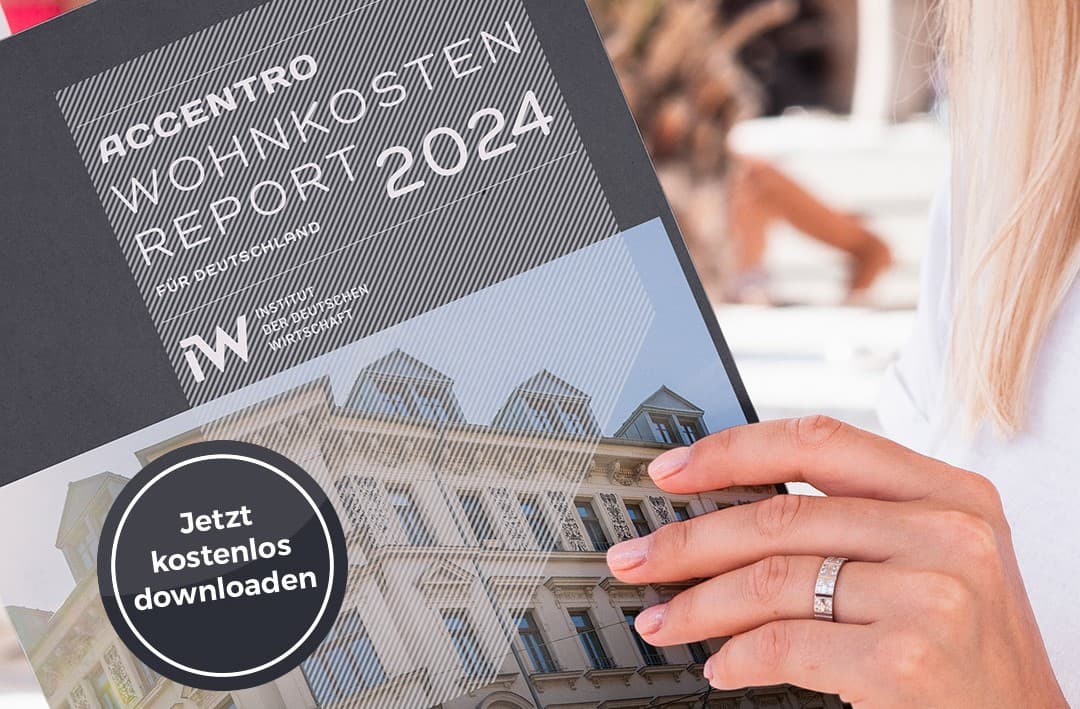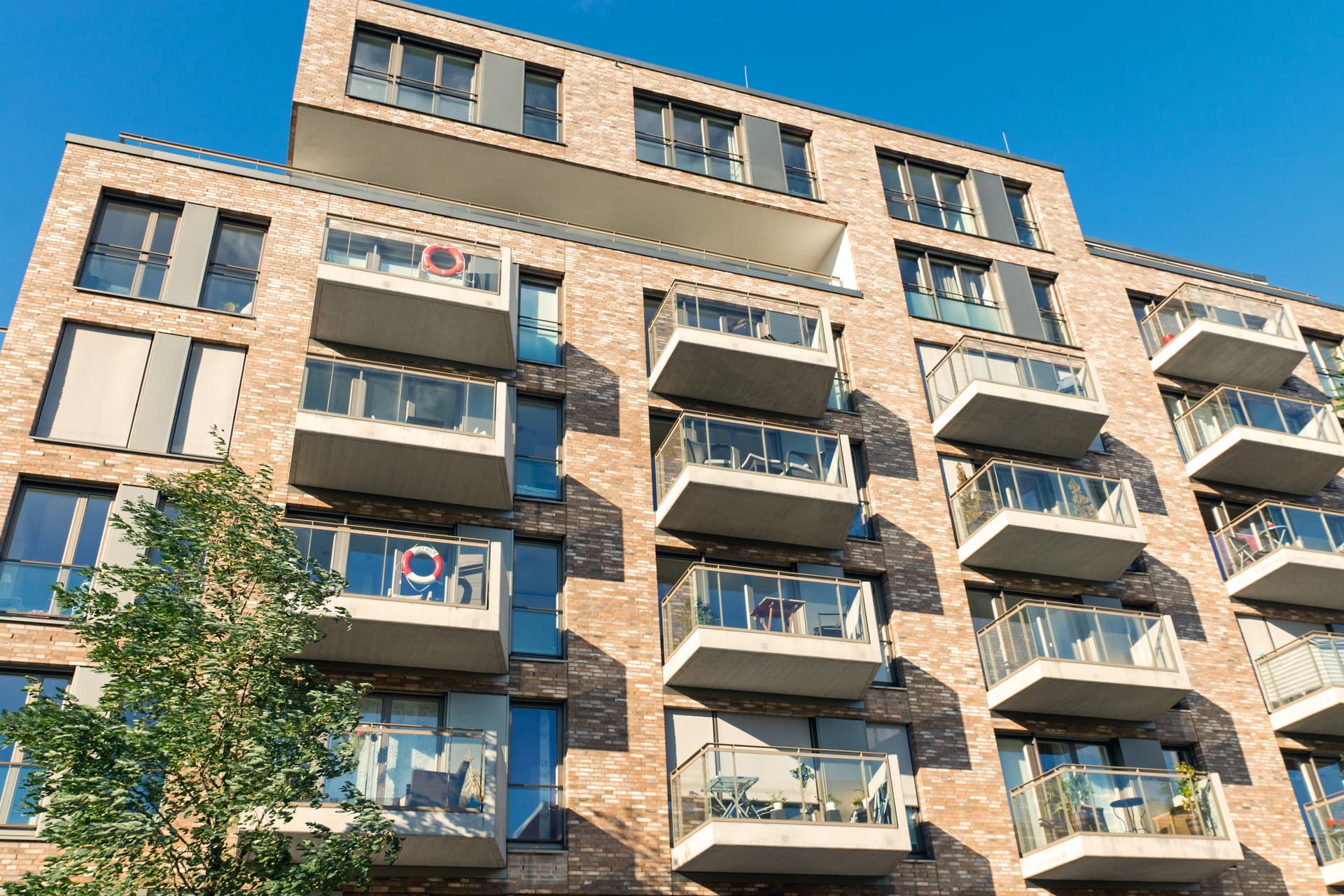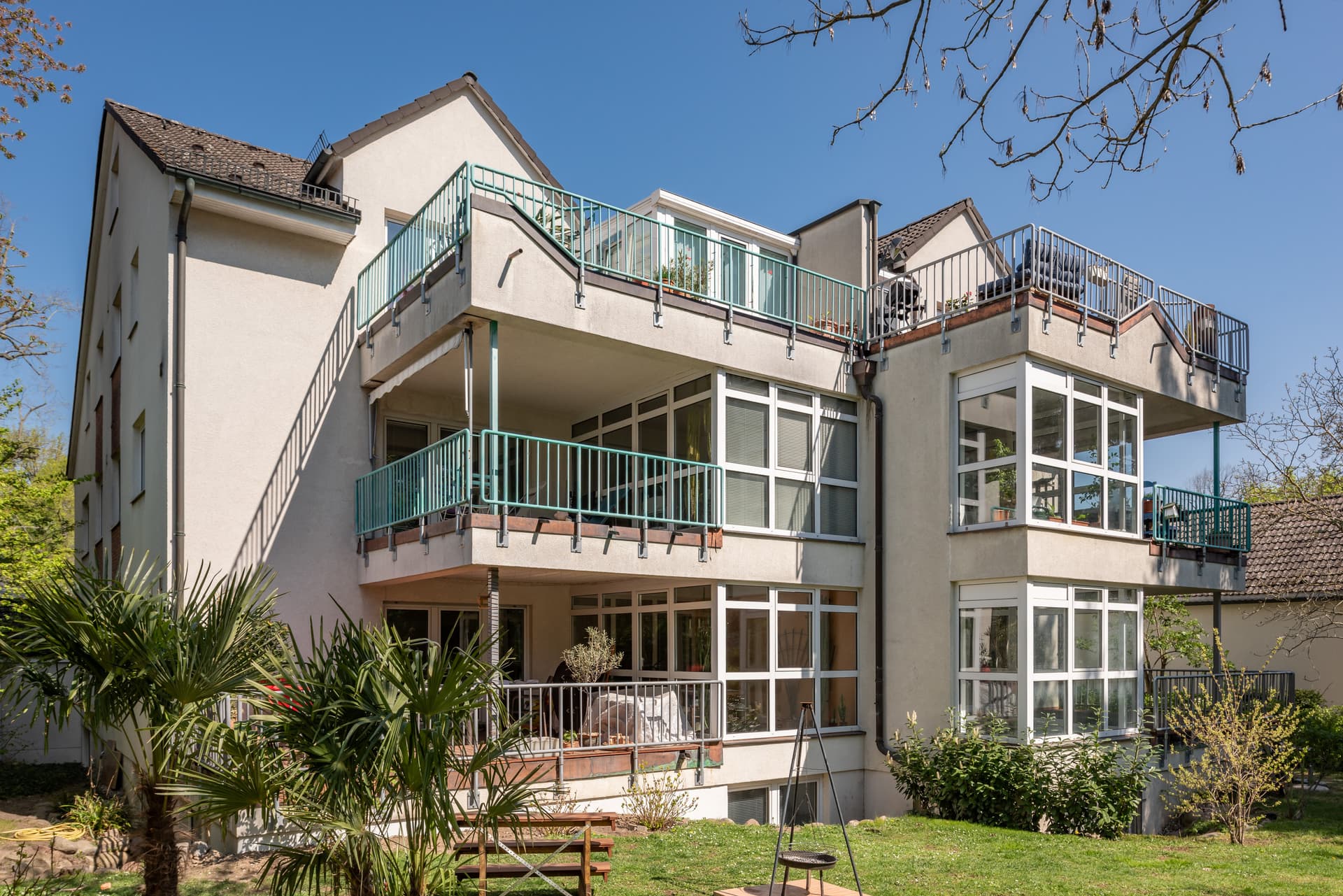
Knowledge

Experience property digitally: the role of technology in modern sales
Technology is revolutionizing the real estate market: Virtual tours, AI, and Big Data are changing the way we find and sell properties. But what’s really behind these innovations, and what opportunities does the digital future hold?
Continue reading
ACCENTRO Housing Cost Report: Renting or buying? The facts for 2024
Do you also dream of owning your own four walls? Then watch out: 2024 could be the perfect year to make this dream come true. The latest ACCENTRO Housing Cost Report shows that entering the housing market is particularly lucrative at the moment.
Continue reading
The Psychology of Buying Real Estate: What Influences the Decision?
Buying a home is more than just a significant investment – it marks the beginning of a new life phase. When we decide to move into our own four walls, it’s often not just about square footage or price points.
Continue reading
8 steps to real estate as an investment - our guide helps you make the right choice
Discover the most important steps to the perfect investment property! The ACCENTRO Investment Guide offers you easy-to-understand tips and valuable orientation for your investment.
Continue reading
The Importance of Equity in Home Buying: Strategies and Tips for Building Wealth
Equity is crucial for buying a home: It improves loan terms and financial security. Our blog explores strategies like robo-advisors, ETFs, crypto, or family-based support to build wealth effectively.
Continue reading
First floor or high up: which floor should my apartment be on?
First floor or high up: which floor should your apartment be on? Discover the advantages and disadvantages of first floor to top floor. We give you valuable tips to help you find the ideal apartment floor.
Continue readingReal estate purchase

Real estate purchase – your step-by-step guide to homeownership
Buying property – especially in times of low interest rates, is the perfect investment for building wealth and adding security to your retirement at the same time. After all, the latter aspect represents an important building block in the financial planning of both self-employed persons and employees. A survey conducted by the state building and loan association (LBS) in 2019 revealed that two out of three tenants (66 %) in Berlin alone desire homeownership. Fact is: If you own residential property, you will benefit from it sooner or later. This applies not only to owner-occupiers, who benefit from general cost advantages aside from not having to pay rent, as the ACCENTRO Homeownership Report 2021 shows.
As a buy-to-let investor who owns tenant-occupied residential units, you reap the benefits of being a landlord while only having to pay for the fee agreed with the community of homeowners or homeowners’ association (HOA). Buying property thus holds the promise of returns as well as the value-add potential – which is realised either through rental income or when re-selling. But the idea of homeownership raises all sorts of questions: Which kind of property is right for me? Where would I like to own residential property? What needs to be remembered when buying property, and what could I have overlooked? If you are thinking about buying property, you will find essential information right here that will take you through the entire process. From assessments of the current market situation to the selection of the right kind of property for your personal needs, and all the way to the actual purchase procedure and the associated expenses – you will have lots of questions once you decided to buy. We will answer the main ones in this article.
All articles
- Experience property digitally: the role of technology in modern sales
- The Psychology of Buying Real Estate: What Influences the Decision?
- The Importance of Equity in Home Buying: Strategies and Tips for Building Wealth
- ACCENTRO Housing Cost Report: Renting or buying? The facts for 2024
- 8 steps to real estate as an investment - our guide helps you make the right choice
- First floor or high up: which floor should my apartment be on?
- Leipzig as a real estate location: Why buying here is particularly worthwhile
- Maximum return: the secret of the American model's success
- Why now is the time to buy real estate
- Real estate on the outskirts - it doesn't always have to be in the city center
- Buying or renting – 3 steps in the decision-making process
- 5 tips to help you find a real estate agent
- Bidding process real estate
- What is a land charge?
- The purchase of real estate and going to the notary
- Location, infrastructure, yield, value development
- Five advantages of owning your own real estate
- 5 tips to help you when buying your first real estate property
- The lease-purchase and how it works
- Real estate as capital investment
- Have you already invested in real estate?
- Property appraisals to become subject to standard rules across Germany in early 2022
- Number of Planning Consents Hits Second-highest Level since Turn of the Millennium
- New Initiative Wants to Increase Housing Construction and Homeownership Rate
- Condominium Prices Set New Records Despite COVID-19
- Conversion of Rental Flats into Condominiums Remains an Option
- Nearly a Quarter-Million Applications for Child Tax Credit
- Real Estate Glossary
- Acquisition-process
- Digitisation Push in Condominium Sales?
- Child Tax Credit for Home Buyers, while Popular, Fizzles in the Big Cities
- Child Tax Credit for Home Buyers Barely Used in Major Cities
- Reasons Why Germans Find it so Hard to Build Wealth
- German Homeownership Rate Perks up
- Majority of Tenants Desire Homeownership
- Child Tax Credit for Home Buyers more Effective than Assumed
- Germany Lacks 300,000 Family Homes
- Rising Land Prices Jeopardise Housing Development Targets
- Agenda-Setting for Accelerated Housing Construction now Initiated
- It Takes Longer and Longer to Build
- Number of Planning Permissions in Decline
- real-estate-purchase video
- Marco Mendler New Managing Director of Accentro
Table of Contents
Checking whether the time is right: a look at the market situation 1.1 Is this a good time to be buying property? 1.2 Going for homeownership: It depends on your personal situation
For owner-occupancy or as buy-to-let investment: Selecting the right type of property 2.1 What sort of property am I looking for? 2.2 Period building or new-build unit: What are the differences? 2.3 Tenant-occupied or vacant
Making your move: the property acquisition process 4.1 Notarisation appointment 4.2 Sale-and-purchase agreement 4.3 Following the notarisation appointment: What happens next?
After the property acquisition: These are the costs you should expect 5.1 Running costs and what to prepare for
Checking whether the time is right: a look at the market situation
One of the perhaps most important subjects that should always be taken into account concerns the current market situation. To ensure you won’t pay more for a given property than it is actually worth, you should take a look at the current market situation. For instance, selling prices for ownership apartments surged in 75 out of 81 major German cities last year—in some instances by more than 30 percent—despite the coronavirus crisis. Germany’s real estate market has proven to be rather robust. In this context, the Immowelt.de real estate platform compared apartments measuring between 40 and 120 square metres in cities with populations of 100,000 or more.
The upshot of its analysis: At 4,640 euros, the square metre price in Berlin increased by around eleven percent year on year in 2020. The consequences of the brisk price growth in the German capital were most keenly felt in nearby city of Potsdam: Here, prices climbed by 26 percent in 2020. Hitting the mark of c. 4,520 euros, the square-metre price nearly closed in on the price level of Berlin. The analysis also showed that the figures continued the trend seen in 2019, when persistently strong demand for housing had prompted “sometimes hefty price hikes.” So, is this a sign that the right time to opt for homeownership has come? This question will be answered in the next section.

Is this a good time to be buying property?
Industry experts are always keeping a close eye on Germany’s homeownership rate and its positive ramifications for wealth accumulation on the national level. Buying property is a sound decision in line with current trends and an investment rewarded both now and in the future. Many people have a hard time acknowledging this, and understandably so. High incidental acquisition costs, insufficient equity capital, and the question of location initially confuses many people. But this is where experts come in, whose job it is to make realistic assessments of risks and benefits for prospective buyers, to help them overcome hurdles, and to determine what is feasible in each case when the right moment has arrived. Fact is: Looking back at 2020, when the pandemic swept across Germany, it is safe to say that homeownership has gained in value and esteem more than many other things. The attributes of real estate, such as wealth accumulation, retirement planning, and stability of values, remain as attractive as ever. But who is ultimately in a position to seriously consider buying property?
Going for homeownership: It depends on your personal situation
High selling prices are only one aspect of the decision in favour of homeownership, as a survey by the German Economic Institute (IW) shows. The analysis highlights the fact that homeownership among younger lower-income households has declined over the past few years. While Germany’s collective homeownership rate merely declined from 45.9 to 45.5 percent between 2011 to 2017, it dropped from 15.2 to 12.4 percent among the age group of 25 to 34 year-olds and from 40.8 to 38.3 percent among people aged 35 to 44. Although real estate prices have admittedly surged in recent years, the interest load for buyers decreased at the same time. Owners now spend fewer net household salaries to fully repay a mortgage loan than they did as recently as ten years ago. The true issue for many in this context is to equity capital that is crucial for borrowing. After all, the more equity capital you pay down, the better the terms of your financing arrangement will be.
Ultimately, this makes homeownership something of a lifestyle decision. If you have a stable income and bring enough equity to the table, you are in a great position to consider the acquisition of property. And if your own desires and objectives are matched by current prices and conditions of eligible apartments and the terms of financing, the right time to make your move has probably arrived.

Tip:
Prospective property buyers are well advised to remember their long-term plans for their lives (e. g. plans to start a family) but also to consider the odds of unexpected events such as a separation, when reviewing the criteria relevant for buying property. Doing so will make it easier to deflect financial challenges. In the same context, you should not lose sight of the subject of property appreciation.

For owner-occupancy or as buy-to-let investment: Selecting the right type of property
A key question that presents itself when buying property is whether you are buying the apartment as a buy-to-let investment or in order to owner-occupy it. If you are getting an ownership apartment as a home for yourself, you will surely take many emotional aspects into consideration as well, including location and environment of the apartment or the immediate vicinity. Having shopping venues near you as well as educational institutions and optimal transport links is important and should be checked before you decide whether to buy a given ownership apartment. However, it is also always advisable to find out about the management of a given housing estate (management contract), the homeowners association (minutes of HOA meetings), the level of the maintenance reserve set aside, and the budget for the building. Aside from asking to see the HOA meeting minutes, clever buy-to-let investors also ask for legacy lease agreements in order to review them, and for evidence of the regular receipt of rent payments. Having obtained these records, the incoming owner of a tenant-occupied property is able to compare rents with the local rent index and determine the time of the most recent rent increase. Many properties offer the possibility of rent reviews so as to optimise returns. However, you must ensure that the increased rent rate does not exceed the “local reference rent” as specified in Art. 558, German Civil Code.
What sort of property am I looking for?
Fact is: a property’s state of repair is often the most important criterion for the decision to buy. In this context, the building fabric of an older property can be as good as that of a new building.
That is why any kind of property should definitely be inspected before the decision to buy because it may have certain defects. Moisture damage is not uncommon, least of all in period apartments. There may be other defects as well. The following questions are therefore important and should be answered by the selling party: What year was the residential building completed? When were the most recent refurbishment, maintenance and modernisation measures undertaken? Are refurbishment or actual redevelopment measures called for?
Questions of this sort do not tend to come up in the case of newly completed buildings. By definition, everything about them is new. They tend to have better and more advanced fit-out features, and costly maintenance or refurbishment measures are not to be expected during the first few years after completion. Moreover, new buildings of more than three floors tend to include a lift as standard feature, which can make daily errands so much easier. In addition to superior home amenities, a lift in the building will enhance the value of a given property and translate into a higher rate of return.

Period building or new-build unit: What are the differences?
There is no clear-cut answer to the question whether a period apartment or a new-build apartment is the better choice. Everyone has personal dreams and preferences, and ultimately it is the feel-good factor that makes all the difference. Either option has its pros and cons.
Here are the benefits of a new-build apartment:
a flawless state – no need for repairs or refurbishments to be expected in the near future
high-end modern specification
prospect of higher rent revenues when letting
low service charges
high property value, especially in sought-after locations
higher energy-efficiency
Here are the benefits of a period apartment:
classic ambience with character and charm
high ceilings, often decorated with ornamental plaster
often more affordable than new-build homes
historic wooden floors
Here are the drawbacks of a new-build apartment:
in most cases much pricier
design features that may seem cold and impersonal
Here are the drawbacks of a period apartment:
higher service charges
possible damages or defects that may cause substantial upgrade and refurbishment costs
constraints on restructuring work, e. g. due to heritage protection rules
frequently without lift
walls often thin – noise nuisance
often elevated energy consumption
Tenant-occupied or vacant
When buying a tenant-occupied apartment as buy-to-let investment, emotional reasons such as personal taste tend to take the back seat. Instead, criteria like relettability, financial feasibility, rate of return, the building’s state of repair and the community of homeowners become far more interesting and important.
An important question that often comes up with an occupied apartment as buy-to-let investment: What kind of operating costs should I expect, relative to the rent level? To find out, you should scrutinise the running cost settlements on record. A period apartment, for instance, can be bought vacant or tenant-occupied. Options with a vacant apartment include upgrading it before letting it for a higher rent. Upgrades will usually let you bypass possibly existing rent caps. But having a tenant with no rent arrears is also a good thing. These decisions should not be made lightly because they will have significant influence on your rent revenues and thereby on your returns. Whenever new-build apartments are pricier than units in standing properties, their advanced home amenities (e. g. high-end bathrooms, underfloor heating, motorised blinds, etc.) often justify higher rent rates. Again, much depends on the purpose an apartment is intended for, meaning the question whether it will be owner-occupied or rented out.
Once you have made up your mind and selected a property type, you can start hunting for the perfect property. ACCENTRO offers a large range of properties available for sale that match every kind of taste. We maintain a presence on the ground across Germany, with focal areas being Berlin and major East German cities and conurbations as well as the Rhine-Ruhr metro region and Bavaria. ACCENTRO gives prospective buyers the opportunity to pre-register for preferred properties based on their search criteria. Whenever a property matching the criteria comes up for sale, you will be among the first to be notified.

Financing – what can I afford?
Once you have a rough idea of the costs you face when buying your dream property, you should determine your financial latitude. After that, it is time to do a cost calculation in order to draft a financing schedule. By compiling a statement of costs (overview of income and expenditure) you will determine how much equity capital you can contribute to your financing arrangement and what kind of monthly loan instalment you can afford.
The following questions and steps are important in this context:
Are you entitled to discounted loans sponsored by the KfW development bank or perhaps to public funding by your state or municipality? Could you be eligible for child tax credit for first-time home buyers?
Check your documents such as payslips or identification papers for completeness and currency.
How much are you willing and able to spend on the property you have in mind? Determine your options by comparing your income and expenditure.
How much equity capital can you pay down as part of your financing arrangement? As a rule, it is safe to say: The more equity you commit, the better the terms of interest.

Tip:
Terms of interest vary from one bank to the next, sometimes substantially so. It is therefore recommended to request several financing offers and to choose the one most advantageous for you.

Making your move: The property acquisition process
Once you have found the perfect apartment, have determined your financial options, and come to terms with the seller, the next step is a visit to the notary. Of key importance in this context is the sale-and-purchase agreement as the centrepiece of any property acquisition.
Notarisation appointment
For many, buying a home is the first time they get in touch with a notary public. The main tasks of the notary are to advise the contracting parties, to draft or review the sale-and-purchase agreement, to supervise the execution of the sale-and-purchase agreement, and to monitor the land register entry, among others. In addition, the notary’s job is to ensure payment from the buyer to the seller and a smooth transfer of possession, benefits and burdens from seller to buyer. To this end, the notary will invoice the purchase price, but only after conveyance of the property to the buyer has been fully secured. Prior to the notarisation appointment, the notary will review the land register and the list of pending applications. These provide details on plot ownership, possibly registered land charges and filed land register entries still pending, if any. The check will reveal legal specificities concerning the person of the registered owner as well as land charges that will not be taken over by the buyer and that will therefore have to be deleted when executing the sale-and-purchase agreement.
Sale-and-purchase agreement
The notary will draft the sale-and-purchase agreement on the basis of the insights gained from the land register. The notary must ensure an impartial, appropriate and balanced structuring of the draft agreement. It should include the following items:
details on both contracting parties
an account of the object of the sale-and-purchase agreement
purchase price and terms of payment
date of the transfer of possession, benefits and burdens
buyer rights/warranty rights in the event that defects come to light
the rules governing interest on arrears
one-off agreements between seller and buyer, if any

As soon as consensus among the parties regarding the draft agreement has been reached, the actual notarisation can proceed. On occasion of the appointment, the notary verifies the identities of buyer and seller, and reads the sale-and-purchase agreement out loud to the parties in attendance. At any time during this process, the notary will answer questions. Next, both parties sign the agreement or deed, as it is also called. However, the endorsement will not automatically convey ownership of the property to the buyer.
Following the signing of the sale-and-purchase agreement, both seller and buyer will receive a copy of the agreement (in excerpts). Next, the notary will apply for a priority notice of conveyance in the land register. This will secure your rights as buyer until you are registered as new owner in the land register. The notary will keep you updated on every step of the process.
IMPORTANT TO NOTE: Prior to your notary appointment, you should secure the financing of your property acquisition, and have it confirmed by a corresponding statement by the financing bank. This financing confirmation by the lending bank will be presented to the seller at the notary’s.

Following the notarisation appointment: What happens next?
Assuming all prerequisites for payment are met, the notary will submit a request for payment (payment notice) to the buyer. The notarial deed will stipulate that the purchase price be paid by the buyer within a period set by the two parties once the prerequisites for payment are met. Upon payment of the full purchase price and receipt of the clearance certificate (confirmation of the payment of the real estate transfer tax) from the inland revenue office, the notary will apply for registration of the buyer as new owner in the land register – which will conclude your property acquisition.

After the property acquisition: These are the costs you should expect
There is regrettably no way around the incidental acquisition costs, and these differ from one German state to the next. They include both the costs for possibly necessary refurbishments as well as the notarial charges and the real estate transfer tax which will have to be paid for out of the total sum you determined. If you contracted an estate agent, the agent’s fee will be part of the total as well. The amount of the estate agent’s fee also varies from one region in Germany to the next. However, estate agent fees charged for sales of owner-occupied apartments and single-family detached homes to consumers anywhere in Germany are governed by a new law pursuant to Article 656b, German Civil Code (BGB), that has been in effect since 23 December 2020. Under the new law, buyer and seller agree to split the estate agent’s feel evenly and to pay it accordingly. The arrangement potentially reduces the buyer’s incidental acquisition costs by thousands of euros. Here is an example: If seller and buyer split the estate agent’s fee for a property in Berlin that was acquired at a price of 250,000 euros, the legal reform lowers the agent’s fee for the buyer from 7 percent to 3.5 percent. In the case at hand, the estate agent fee of formerly 17,500 euros would be slashed in half, down to 8,750 euros.
The real estate transfer tax, being a state-level tax, varies from one German state to the next. In Berlin, for example, the going rate is 6 percent.

Running costs and what to prepare for
Even as a property owner, you will not be able to steer clear of certain payments your already faced as a regular tenant. Depending on the energetic standard of a given property, heating costs can be quite high. You will get a first idea of these costs from the energy performance certificate the seller is obliged to submit to you. The legal basis for this is the German Energy Saving Ordinance (EnEV) that is binding for both property sellers and landlords. Other service charges, such as those for clean water and electricity or for the building insurance need to be factored in as well, because they will be passed on to you by the previous owner.
It makes sense to set money aside on a monthly basis lest you be caught off guard by the sudden expense of an unexpected repair. If you buy a period apartment, for example, whose floors or windows have not been replaced yet because they are still in good repair, you should bear in mind that upgrades or refurbishments will become necessary sooner or later.
Tip:
Be sure to find out about possible funding opportunities for residential property and for energy refurbishment measures. The business promotion bank of Brandenburg (ILB), for one, sponsors sustainable upgrade and reinstatements of owner-occupied homes with interest-free loans and grants. In line with its climate change mitigation program, the German Government has expanded its subsidy programs to ensure that as many homeowners as possible invest quickly in energy upgrades of their apartments. Up to 20 percent of the costs of energy efficiency measures are tax-deductible over a period of three years. All you need to do in order to qualify is to declare the costs incurred when filing your individual income tax return at your inland revenue office.

As you can see, one question leads over to the next when the topic is buying property. It is in many ways a personal decision whether or not you can afford to buy, what kind of financing to obtain, how many bedrooms the apartment should have, and where it should be located. Important to remember throughout is that buying a home is actually not rocket science, and that the path to homeownership is open to anyone. Expert opinions and professionals are here to help and to pave your way until your dream of property ownership is eventually just a signature away. Have you previously invested in real estate, or would you like more information before taking the step? If so, these articles may help you make up your mind: https://accentro.de/en/knowledge/news/rent-rates-berlin https://accentro.de/en/knowledge/real-estate-purchase/have-you-already-invested-in-real-estate https://accentro.de/en/knowledge/real-estate-purchase/five-advantages-of-owning-your-own-real-estate
For these and other topics involving real estate, browse our knowledge blog at: https://accentro.de/en/knowledge

The Psychology of Buying Real Estate: What Influences the Decision?
Buying a home is more than just a significant investment – it marks the beginning of a new life phase. When we decide to move into our own four walls, it’s often not just about square footage or price points.
Continue reading
8 steps to real estate as an investment - our guide helps you make the right choice
Discover the most important steps to the perfect investment property! The ACCENTRO Investment Guide offers you easy-to-understand tips and valuable orientation for your investment.
Continue reading
Maximum return: the secret of the American model's success
Read our new article to find out how American investors benefit from real estate and what influence location and energy efficiency have on returns.
Continue reading
Buying or renting – 3 steps in the decision-making process
Renting versus ownership: Germany has high rental rates, but is property acquisition worthwhile? We examine reasons, the purchase price-to-rent ratio, and alternative investment options. A crucial decision for financial planning
Continue reading
The Importance of Equity in Home Buying: Strategies and Tips for Building Wealth
Equity is crucial for buying a home: It improves loan terms and financial security. Our blog explores strategies like robo-advisors, ETFs, crypto, or family-based support to build wealth effectively.
Continue reading
First floor or high up: which floor should my apartment be on?
First floor or high up: which floor should your apartment be on? Discover the advantages and disadvantages of first floor to top floor. We give you valuable tips to help you find the ideal apartment floor.
Continue reading
Why now is the time to buy real estate
Despite previous price declines, the real estate market is showing signs of a turnaround. Find out why now is the time to buy real estate to benefit from future increases in value here.
Continue reading
5 tips to help you find a real estate agent
What exactly are the special qualities and skills that make a good real estate agent? We have compiled 5 tips that can help you choose the right one.
Continue reading
ACCENTRO Housing Cost Report: Renting or buying? The facts for 2024
Do you also dream of owning your own four walls? Then watch out: 2024 could be the perfect year to make this dream come true. The latest ACCENTRO Housing Cost Report shows that entering the housing market is particularly lucrative at the moment.
Continue reading
Leipzig as a real estate location: Why buying here is particularly worthwhile
Leipzig is booming: the dynamic city is attracting investors with its economic growth, attractive real estate prices and high quality of life. Find out why buying real estate here is particularly worthwhile in our latest blog post.
Continue reading
Real estate on the outskirts - it doesn't always have to be in the city center
Discover the advantages of real estate in suburban locations! With more space, nature and a relaxed atmosphere, they offer an attractive alternative to the city center. Find out why it's worth looking to the outskirts in our blog.
Continue reading
Bidding process real estate
A freehold apartment is rarely sold by bidding process in Germany - even though this sales method has become more popular in recent years. We explain what it's all about.
Continue reading